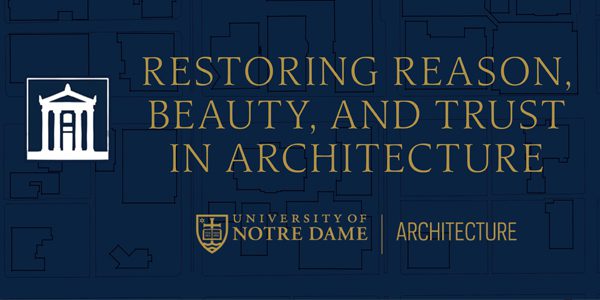Anticipatory Innovation: Capitalizing on Change in Turbulent Times – To Act With Resilience
Subscribe to the ThinkND podcast on Apple, Spotify, or Google.
Featured Speakers:
- Dr. Melvin Dowdy, Executive Education Programme Faculty, Licensed Clinical Psychologist, Ph.D., M.Div., M.A., Mendoza Business School’s Executive Education Center at Notre Dame
- Lisa Caulfield, Director of the Global Centre at Kylemore
The second virtual event of the Anticipatory Innovation- Capitalizing on Change in Turbulent Times featured a discussion around resiliency and how it plays a role in one’s life. This event was moderated by Lisa Caulfield, Director of the Global Centre at Kylemore, and featured Melvin Dowdy, Executive Education Programme Faculty, Licensed Clinical Psychologist, Ph.D., M.Div., M.A. In this session, Dowdy shared his thoughts on how resilience can be built overtime and how it can affect an individual and their leadership. Dowdy also shared an excerpt of a poem included in his new collection titled “Night Weavers,” which was published in November 2020.
Dowdy started the conversation by offering the popular definition of resiliency as the capacity to bounce back to previous or higher levels of functioning after facing stress or trauma. Dowdy furthered this definition by saying that residency is not just a “static capacity,” but rather a behavioral pattern, set of actions, or a way of living that one can discover in stress, trauma, or change. If one can discover those patterns and learn from them, then one can better prepare for stress, or trauma when it comes again. To build resilience, there are three elements Dowdy suggests that one should strive to recognize, present moment awareness, willing acceptance, and the transcendent self.
Dowdy explains the element of present moment awareness as learning to be honest with oneself about the stress one might be under. To help contextualize this element, Dowdy offered an example from his own life where he practiced present moment awareness in a time of high stress. Five years ago, Dowdy’s wife suffered from a stroke that paralyzed her from the waist down and it was uncertain that she would walk again. Dowdy practiced present moment awareness in this situation by learning to sit with his stress and be mindful of it. Dowdy would write about what he was feeling in these moments. These moments eventually manifested itself in poetry, which Dowdy read an excerpt of in the event. One way Dowdy says one can get better at living in the present and involving mindfulness is through simply noticing what we are noticing. Practicing this will provide great insight to what captures one’s attention and what one attends to most.
Willing acceptance is the second element in building resilience. Part of willing acceptance is being able to accept our feelings and figure out what to do with it. Dowdy asserted that one cannot pick and choose what to accept and push away the rest. If that information is pushed away, the insights one could have gained from that information will be lost. The element of willing acceptance allows one to think about who they are and what they stand for.
The final element that Dowdy mentioned was the transcendent self, meaning one must step into the experience without blame and move forward. This includes committing oneself to a path of action, discovering and learning from the experience, and bouncing back. Practicing these three elements can make better leaders and more resilient people by taking these lessons and applying it to the next time stress comes along. Dowdy finished by reminding everyone that stress and suffering can be used as a gift of discovery and learning through resilience.
This event concluded with a short breakout session for viewers to meet and further discuss Dowdy’s poetry and insights about resilience.
- The popular definition of resiliency is the capacity to bounce back to previous or higher levels of functioning after facing stress or trauma (7:50)
- “Resiliency isn’t a static capacity. It isn’t something we develop like a muscle. It’s really a behavioral pattern, a set of actions, a way of living that we discover in the context of stress, trauma, and lots of change. If we develop and discover those patterns of life and make them a regular part of who we are and the way we approach life, the we prepare ourselves for the next time a large amount of stress comes upon us” (Melvin Dowdy, 8:36)
- The three core elements of building resilience are present moment awareness, willing acceptance, and the transcendent self (10:03)
- “If I look to suffering as a lesson or as a gift, not as a burden, I just might discover something that is wonderful” (Melvin Dowdy, 56:08)
- Stress and suffering can be used as a gift of discovery and learning through resilience (56:10)
- “It’s not if we suffer, it’s how we suffer and the way we suffer that matters in terms of learning” (Melvin Dowdy, 57:15)
Related Content
How Cities Speak To Us
Professor Emily Talen joins the School of Architecture to share her work at The Urbanism Lab and its focal point at the University of Chicago for the study of the built...
View EventThe Black National Anthem & Parent’s Signing Off On Children Reading Black Books
In this week’s episode, Isaiah and Tykiera talk about some tweets about Black people that took Twitter by storm. They also talk about The Black National Anthem, Lift Every Voice...
watch videoTrusted AI Needs Trusted Data
In the buzz around AI, let’s not ignore the role of data for developing AI we can trust, says one Notre Dame computational scientist. Two years ago, Notre Dame launched the...
Read Article


